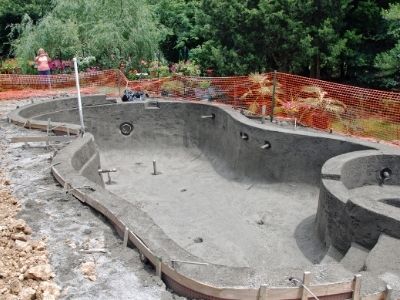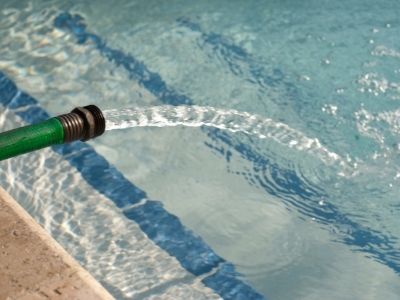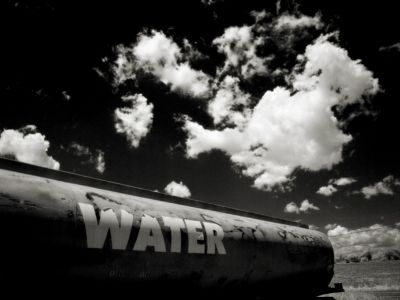You’re a swimming pool owner, and each time you open the pool for another summery season, you both love and loathe the time. You hate it because you know you have to fill your pool, and it’s very time-consuming. You had a thought – since firefighters have access to so much water via their hoses, can they fill the pool for you?
Generally, fire departments will not fill a residential swimming pool. Filling the pool could be a potential liability, plus, the water the fire department uses for your pool isn’t putting out fires and saving lives.
If you prefer videos, check out this video from the FirefighterNOW YouTube channel explaining why fire departments will not fill a pool (amongst other things)…
In this post, we’ll explore in more detail the reasons that fire departments usually do not fill residential swimming pools. We’ll also talk about how you can expediently fill your own pool without relying on local firefighters.
Table of Contents
Why Fire Departments Rarely Fill Swimming Pools
When it comes to fire departments across the United States, we’ll never say never. Some fire departments might be willing to fill your pool, as we’ll talk more about in the next section. For the most part, though, your request will be declined.
It’s nothing to take personally. If the fire department says they won’t fill your pool, you can reasonably assume they’re not filling your neighbor’s pool down the block either. Here are a handful of reasons why firefighters don’t offer this service.
Your Pool Is Not an Emergency
When you call 911 to contact your local fire department, you’re usually doing so in the context of an emergency, like a house fire or a building fire. Getting your swimming pool filled for the summer is a priority (for you, at least), but it’s not a life or death situation.

Even if you call the non-emergency services number to contact your fire department, they’ll more than likely still turn you down. The job of a firefighter first and foremost is to respond to emergencies, not prep your pool for the summer.
Uses Necessary Resources
A city or town only has so much water. In most situations, a fire department won’t deplete that source of water, but if they use it needlessly, well, then it becomes harder to say if they’ll have enough water.
Firefighters should use their hydrants and hoses for combatting fires. When you get your pool filled by the fire department, that’s less water the firefighters have for life-saving services.
Liability Reasons
If you remember our post about why firefighters don’t install car seats for new parents, it’s because there’s a huge risk of liability.
If the firefighters happen to make a mistake in the installation and the parents’ newborn baby gets hurt or worse, who do you think the parents will go after, the fire department or the car seat manufacturer? Well, it will probably be both, but they’ll start with the firefighters.
It’s not a very different story when firefighters fill your pool. Let’s say the highly pressurized water causes your pool liner to ripple or the water even separates the concrete of your pool deck. You know it wasn’t like that before the firefighters came to your home to fill up the pool.
You’ll legally pursue the fire department to get restitution. After all, replacing your pool liner or deck can be quite costly!
Another liability issue that can arise when the fire department helps with your pool is a debate over the quality of the water. If the water pipes or the water tank on board the fire engine aren’t disinfected, then how can you know if the water that’s filling your swimming pool is safe?
You can’t. If algae develop in the pool or one of your kids swallows some and gets an ear infection or a stomach illness, once again, the onus is going to be on the fire department. They don’t want that, so they’re better off not filling your pool in the first place.
Can Set a Bad Precedent
Imagine this scenario: you call your fire department, and they fill your swimming pool for you. You’re pleased with their service, so you post about it on Facebook. Although your post is meant to be positive, what results will be negative.
Anyone in your neighborhood who sees your post and happens to have a pool of their own is now going to think they no longer have to go through the hassle of filling the pool themselves. They can call the fire department.

Your local firefighters are inundated with requests that get in the way of what firefighters are supposed to do in the first place: put out fires and save lives.
Will a Fire Department Ever Fill a Pool?
As we said in the last section, some fire departments might decide to fill your swimming pool. This should be considered an exception though and not the norm. In other words, be grateful and appreciative this season, but next pool season, have a plan for filling the pool that doesn’t involve your local firefighters.
What are some situations in which a fire department will decide to fill a pool knowing that the above factors are all at play? If the department is having a particularly slow day (which can happen sometimes), they might be able to dispatch some of their firefighters to your home without the worry that a fire will break out elsewhere in town.
The American Red Cross states that December and January are the most common months for house fires. In the summer, when most people open their pools, the fire department might have the time to help.
More often, if a fire department agrees to fill your pool, it’s usually as a type of charity incentive to raise money for the local crew. If you donate a certain amount of money, then your reward will be that the firefighters fill your pool for you ahead of the season.
If others want the service, they’d have to donate as well. This way, the fire department earns some money out of the deal. It’s not like pool companies open swimming pools for free, after all!
How Do You Know Whether the Fire Department Will Fill Your Pool?
Now that you’re aware of instances in which a fire department might agree to fill your pool, you have to know, will your local firefighters do it? The only way to be sure is to contact the fire department nearest you.

We want to stress that you should always call the non-emergency number. Never dial 911 unless it’s an emergency, in which getting your pool filled does not qualify.
We’d say to be ready to hear a negative response. If that’s the case, then be respectful , thank the fire department for their time, and move on.
Don’t try to push the issue. You must remember that liability is a very serious concern for a fire department should they decide to fill your pool. The fire department doesn’t want to face a potential lawsuit for trying to do a good thing.
3 Suitable Options for Filling Your Pool
As you had kind of expected, when you called your local fire department, they turned down your request to fill your pool. While you were on the phone with the fire chief, you had another thought. If firefighters were going to use a fire hydrant to fill your swimming pool, couldn’t you do the same?
While this is a creative idea, it’s not the best one if you care about the condition and longevity of your pool. First, where are you even going to get a fire hydrant from?
Even if you had easy access to a hydrant, using it is not as easy as it seems. Plus, with so much water rushing at your pool at high pressure, you could ruin your pool liner, your deck, your landscaping, or anything in the vicinity of the pool. It’s not worth it.
Instead, try these other reliable methods for filling a pool.
Garden Hose
The garden hose method is the one that most swimming pool owners use for a reason: it gets the job done. Is it fast? No, but it’s efficient. All you have to do is crank on your garden hose knob, put the hose in the water, and wait.
Periodically, go out and check the water levels to ensure they’re not getting too high. When your pool is adequately filled, turn off the hose, remove it from the pool, and tuck the hose line away.
Well Water
Some pool owners with wells on their property opt to use well water to fill their swimming pool. Unlike a garden hose, which uses soft (aka mineral-free) city water, well water usually contains minerals such as sulfur that can alter the chemical balance of the pool.
If you must use well water, test the pool water chemistry immediately after filling the pool. Add the appropriate chemicals and monitor your pool to see if the chemistry balances out.
Water Delivery Service
You can also take advantage of a water delivery service to get your pool filled in a jiffy. Many pool companies can recommend a water delivery service to you, or you could find your own through online research.

The water the service will deliver is usually pre-treated, but always ask before gallons of water are dumped into your pool. At that point, there’s no going back!
Finally, fire departments rarely fill swimming pools due to the liability of doing so, the precedent it would set, and the reduced resources and manpower that’d be available at the fire station.
Although that often means you’re left filling your swimming pool yourself, we want to again remind you not to use a fire hydrant to do it. It rarely goes as smoothly as you think it will!